
Paios Modules
Flexible Probe Station
Paios is delivered with a probe station to provide a fully calibrated system down to the contacting probes. Our probes are designed to get a reproducible contact with low parasitic resistance to your device. The magnetic feet are flexible for different sample layouts. All module functionalities below are operated through the Fluxim Characterization Suite (CS) software—integrating hardware control, data acquisition, and analysis for Paios systems.
The device can be easily aligned using our alignment tool.
The measurement table comes with a black lid to ensure the reproducibility of dark measurements.
We also deliver a customized sample holder upon request.
Spectrometer
Measure the emission spectrum of your LED or solar cells. You can perform all Paios experiments for LEDs with a calibrated spectrometer.
Wavelength range: 360 – 1100 nm.
Integration time: 1 ms to 10 min.
Automatic dark-spectrum correction.
Measure luminance, radiance, EQE, lm/W, CRI, CIE coordinates.
Liquid Nitrogen Cryostat
Perform all Paios experiments at low and high temperatures with this liquid nitrogen cooling and heating system.
Automatic temperature control and data acquisition.
Temperature range: -150°C to +200°C.
Maximum temperature ramp: 40 K/min.
Samples are stored under an inert atmosphere.
Peltier Cryostat
Perform all Paios experiments at low and high temperatures.
Automatic temperature control and data acquisition.
Peltier cooling system.
Customized sample holder included in the standard product.
Temperature range: -50°C to +80°C.
Flexible mounting of the LED, photodiode, or spectrometer is required for the specific measurement.
Multiplexing: Measuring 4 solar cells or LEDs in sequence automatically.
The chamber can be evacuated or flushed with inert gas.
Automated Measurement Table
The automated measurement table switches between measurement instruments or light sources, automatically. The standard configuration is equipped with:
Photodetector
Spectrometer
White LED
Multi-LED module (additional 15 monochromatic LEDs)
Nanosecond Pulser module
Empty space for existing sun simulator
For Solar Cell Research
The white or monochromatic LED(s) can be used for illuminating solar cells in steady-state IV-curves as well as fast light pulses and light-modulated experiments. By switching to the photodetector or spectrometer you can furthermore analyze the electroluminescence properties of efficient solar cells.For LED Research
Measure the OLED/PLED spectrum, efficiency rolloff, and transient electroluminescence without changing manually the measurement setup. By using a blue or UV LED, Paios can also measure the OLED/PLED photo-response.
Custom Sample Holder: Multiplexing
Quantitative conclusions from experiments usually require statistics from characterizations on multiple devices. This can be tedious and time-consuming.
With the Paios multiplex module, up to 4 devices can be connected simultaneously. Paios measures the devices automatically after each other. This saves a lot of time for the operator.
Combination with Customized Sample Holder
We also offer customized sample holders on request. The sample holder is compatible with the regular measurement table.
Multi-LED Extension Module
15 monochromatic LEDs (300-1600 nm available)
Controlled and integrated with the Automated Table
Measure all experiments with different pulsed LEDs
Linearity and absolute spectral calibration
Measure mini-EQE of solar cells
Glovebox Feedthrough
Paios can also be used in combination with a glovebox. Upon request, we provide customized cable feed-through for your glovebox.
Paios is placed outside the glovebox and the measurement table (or the sample holder) can be used inside.
Source Measure Unit (SMU)
The standard Paios has a measurement range of +-12 Volt. With the SMU module, the voltage range is extended to +-60 Volt. High voltage also allows the measuring of tandem OLEDs with high turn-on voltages. Important for Space Charge Limited Current (SCLC) measurements.
Min measurable current: 1 pA.
You can also perform AC measurements in the frequency range 10 mHz to 10 1 kHz with offset voltages up to 60 volts.
Measure transient experiments with sampling frequency 100 kS/s.
The user can choose whether the single experiment shall be conducted with the source measure unit (SMU) or the regular Paios.
Battery Module
The Battery module uses the SMU for the characterization of solid-state thin-film batteries and other electrochemical devices.
Ideal to perform several standard characterizations such as:
Impedance
Cyclic Voltammetry (CV)
Charge-Discharge Cycles





